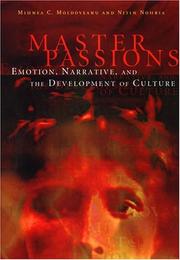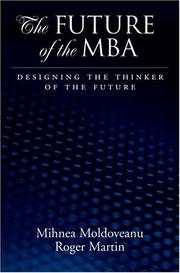| Listing 1 - 6 of 6 |
Sort by
|
Book
ISBN: 080477742X Year: 2011 Publisher: Stanford, Calif. : Stanford Business Books,
Abstract | Keywords | Export | Availability | Bookmark
 Loading...
Loading...Choose an application
- Reference Manager
- EndNote
- RefWorks (Direct export to RefWorks)
Inside Man presents readers with an exercise in modeling human ways of being—thinking, feeling, acting. This book does not merely introduce models, but also attempts to teach modeling and to produce, within the reader, the predispositions and attitudes of the modeler: a distance from the individual whose behavior is modeled, an engineering approach to the model-building process, a (self)-critical approach to the model testing and elaboration process, and a pedagogical and a therapeutic approach to enacting and communicating models. Author Mihnea C. Moldoveanu makes the process and the phenomenon of modeling transparent and explicit, and clarifies the reasons for which modeling human behavior has to be an interactive process between the modeler and the modeled. This perspective situates Inside Man at the intersection of analytical and computational thinking about rationality, reasoning, choice and thinking, and the tradition of action science and action research.
Human behavior models. --- Thought and thinking. --- Psychology --- Methodology.

ISBN: 0262280086 058544255X 0262263769 9780585442556 9780262280082 9780262134057 Year: 2002 Publisher: Cambridge, Mass. MIT Press
Abstract | Keywords | Export | Availability | Bookmark
 Loading...
Loading...Choose an application
- Reference Manager
- EndNote
- RefWorks (Direct export to RefWorks)
An exploration of the powerful role of anxiety, ambition, and envy in shaping both our individual lives and society as a whole. At the heart of the human experience lies anxiety caused by the realization that the world is unknown, forever eluding our control. And out of this anxiety arises the master passions of ambition and envy, which we repress to mask their power over our lives. Discussion of the role of the emotions in our lives is not new, but Mihnea Moldoveanu and Nitin Nohria go much further, showing how these passions shape not only our individual lives but our social and organizational culture as well. The master passions are not pretty, and so we cover them with the more socially acceptable faces of reason and morality. Moldoveanu and Nohria guide the reader in revealing the real impetus behind such actions as firing a friend, leaving a lover, or even pillaging your own people. Below the rational explanation, they show, often lies a willingness to hurt or even destroy others to fuel our own ambitions or quench the fires of envy. The authors offer intriguing thought experiments and examples from their own lives as they expose the power of the master passions. Deftly weaving ideas from psychology (Sigmund Freud), sociology (Max Weber), literature (William Shakespeare, Albert Camus), and philosophy (David Hume, Adam Smith, Karl Marx, Friedrich Nietzsche) with the personal, they build a strong argument that society would be much healthier if we faced the deception and self-deception that pervade our lives.
Emotions --- Ambition. --- Envy. --- Social aspects. --- Aspiration (Virtue) --- Deadly sins --- Jealousy --- Virtues --- COGNITIVE SCIENCES/Psychology/Cognitive Psychology --- PHILOSOPHY/General
Book
ISBN: 9781503629813 1503629813 9781503628724 Year: 2022 Publisher: Stanford, California
Abstract | Keywords | Export | Availability | Bookmark
 Loading...
Loading...Choose an application
- Reference Manager
- EndNote
- RefWorks (Direct export to RefWorks)
Executive development programs have entered a period of rapid transformation, driven by digital disruption and a widening gap between the skills that participants and their organizations demand and those provided by their executive programs. This work delves into the objective functions of the executive development space, analyzes the demand characteristics of the learners and the organizations that pay for the programs, and the ways in which business schools and other providers deliver (or not) on the promises they make regarding skill development and the continued value of learning to the organization. They show how a trio of disruptive forces (disintermediation, disaggregation and decoupling) which have figured prominently in industries disrupted by digitalization,are reshaping the structure of demand for executive development. The authors look at the future of executive development in the era of self-refining algorithms (aka machine learning) and wearable sensors and computers, and offer a compass for making the right choice for CEOs and CLOs who are guiding executive program design. Ultimately, they offer a guide for to optimize the learning production function for both skill acquisition and skill transfer – the two charges that the new skills economy has laid out for any educational enterprise.
E-books --- Management --- Executives --- Study and teaching. --- Training of. --- Executive Development. --- Future of education. --- Skills Development. --- Skills Transfer.
Book
ISBN: 1503629813 Year: 2022 Publisher: Stanford, California : Stanford Business Books,
Abstract | Keywords | Export | Availability | Bookmark
 Loading...
Loading...Choose an application
- Reference Manager
- EndNote
- RefWorks (Direct export to RefWorks)
Executive development programs have entered a period of rapid transformation, driven by digital disruption and a widening gap between the skills that participants and their organizations demand and those provided by their executive programs. This work delves into the objective functions of the executive development space, analyzes the demand characteristics of the learners and the organizations that pay for the programs, and the ways in which business schools and other providers deliver (or not) on the promises they make regarding skill development and the continued value of learning to the organization. They show how a trio of disruptive forces (disintermediation, disaggregation and decoupling) which have figured prominently in industries disrupted by digitalization,are reshaping the structure of demand for executive development. The authors look at the future of executive development in the era of self-refining algorithms (aka machine learning) and wearable sensors and computers, and offer a compass for making the right choice for CEOs and CLOs who are guiding executive program design. Ultimately, they offer a guide for to optimize the learning production function for both skill acquisition and skill transfer – the two charges that the new skills economy has laid out for any educational enterprise.
Management --- Executives --- Study and teaching. --- Training of. --- Executive Development. --- Future of education. --- Skills Development. --- Skills Transfer.

ISBN: 9780195340143 0195340140 0199851778 0199712875 128152932X 9786611529321 0199887659 Year: 2008 Publisher: Oxford ; New York : Oxford University Press,
Abstract | Keywords | Export | Availability | Bookmark
 Loading...
Loading...Choose an application
- Reference Manager
- EndNote
- RefWorks (Direct export to RefWorks)
Introduction: The Future of the MBA and the MBA of the Future 1. The Integrative Thinker: A Vision of the High Value Decision Maker of Postmodern High Capitalism 2. Business School 2.0: Can the Contemporary Scientific-Educational Complex Educate the Manager of the Future? 3. Business School 3.0: The Design and Development of Integrative ""Cognitive-Behavioral Modules"" for the Thinker of the Future 4. Epilogue: A Reconstructive Summary of the Basic Arguments of the Book
Book
ISBN: 9781442697751 144269775X 1442697180 0802099912 1487520522 Year: 2010 Publisher: University of Toronto Press
Abstract | Keywords | Export | Availability | Bookmark
 Loading...
Loading...Choose an application
- Reference Manager
- EndNote
- RefWorks (Direct export to RefWorks)
Moldoveanu and Martin draw upon case studies and interviews - as well as theories and models from cognitive psychology, epistemology, analytic philosophy, and semiotics - to offer a new conception of successful intelligence that is immediately applicable to business situations.
Thought and thinking --- Success --- Success in business --- Educational psychology --- Philosophy --- Psychology --- Intellect --- Logic --- Perception --- Psycholinguistics --- Self --- Mind --- Thinking --- Thoughts --- Psychological aspects --- Thought and thinking. --- Psychological aspects.
| Listing 1 - 6 of 6 |
Sort by
|

 Search
Search Feedback
Feedback About UniCat
About UniCat  Help
Help News
News